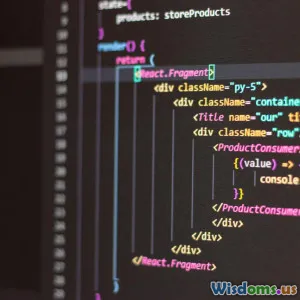
Five Programming Habits That Are Secretly Holding You Back
7 min read Discover five common programming habits that subtly hinder your growth and how to overcome them for better coding success. (0 Reviews)
Five Programming Habits That Are Secretly Holding You Back
Programming is as much about mindset and habits as it is about knowledge and experience. While it’s easy to focus on learning new languages or frameworks, many developers unknowingly fall into patterns that stifle progress and impact code quality and career growth. Recognizing and breaking these habits can unlock your potential and transform how you solve problems and collaborate.
In this article, we’ll dive into five subtle programming habits that might be limiting your growth, backed by real-world insights and actionable advice to overcome them.
1. Skipping Code Reviews: Missing the Learning Opportunity
Code reviews are often seen as a bottleneck or an unnecessary step, especially in fast-paced projects. However, continually skipping or rushing through code reviews can be detrimental.
Why skipping code reviews hurts
- Loss of fresh perspectives: Other developers offer critical feedback, spotting potential bugs, design flaws, or performance improvements you might miss.
- Stunted growth: According to Stack Overflow’s 2023 Developer Survey, developers who actively engage in code reviews report higher confidence in writing robust code and improving coding skills.
- Increased bugs: Projects without thorough reviews suffer from up to 30% more post-release defects on average (source: IEEE Software).
How to turn around this habit
- Treat reviews as a dialogue, not judgment.
- Allocate time in your sprint for meaningful reviews.
- Seek and offer constructive feedback to expand your skill set.
For example, at Atlassian, teams dedicate up to 20% of development time to code reviews, which correlates with faster issue resolution and higher customer satisfaction.
2. Over-Reliance on Copy-Pasting Code
It’s tempting to copy code snippets from online forums, Stack Overflow, or past projects to save time. But blindly copying without understanding the underlying logic can diminish your problem-solving skills over time.
The dangers of copy-pasting
- Technical debt: Non-tailored code can lead to compatibility and maintainability challenges.
- Knowledge gaps: You miss the opportunity to truly grasp algorithms or practices.
- Security risks: Unscrutinized code may introduce vulnerabilities.
Smart approaches
- Use copies as references, not final solutions.
- Spend time adapting and testing the code.
- Invest time in learning before implementation: understanding leads to mastery.
As a concrete case, software firm Redgate emphasizes pairing copy-pasting with thorough comprehension before integration, reducing bugs linked to misuse by 40%.
3. Neglecting Automated Testing
Some programmers see testing as an afterthought or avoid it due to time pressures. However, neglecting automated tests can backfire.
Why skipping tests holds you back
- Slower debugging: Without adequate tests, bugs can be buried and emerge later, requiring more time to fix.
- Reduced code confidence: Fear of breaking existing features inhibits experimentation and refactoring.
- Team bottlenecks: Teams without testing protocols often face delays and higher regression rates.
Data from the State of Testing 2022 report shows that organizations with robust automated testing pipelines fix bugs 50% faster and release features 30% often than those that don’t.
Overcoming test avoidance
- Start small: Write tests for critical components first.
- Utilize TDD (Test-Driven Development) practices where feasible.
- Integrate tools like Jest, PyTest, or JUnit suited to your stack.
For example, Google’s engineering standards mandate automated testing as a prerequisite for code merges, drastically improving stability across millions of daily users.
4. Writing Monolithic, Unmodular Code
Beginners and even experienced developers sometimes write sprawling codebases without thoughtful modularity or separation of concerns.
Why is this a problem?
- Difficult maintenance: One change can ripple unpredictably through the entire codebase.
- Poor scalability: Extending features becomes cumbersome, discouraging innovation.
- Reduced team collaboration: When code isn’t logically structured, onboarding and joint work slow down.
How to improve modularity
- Design functions/classes with a single responsibility.
- Follow SOLID principles where applicable.
- Leverage design patterns to keep code organized.
For instance, Uber transitioned from a monolithic architecture to a microservices approach, resulting in more agile deployments and a 30% improvement in developer productivity.
5. Ignoring Documentation
In the heat of coding, writing documentation feels tedious or unnecessary. Yet, neglecting proper documentation is a silent productivity and collaboration killer.
Consequences of poor documentation
- Increased onboarding time: New team members spend excessive hours deciphering code.
- Knowledge loss: When developers move on, undocumented logic can be lost forever.
- Communication gaps: Misunderstandings about module purposes or APIs lead to bugs.
Practical documentation tips
- Maintain up-to-date README and inline comments.
- Use tools like JSDoc, Sphinx, or Doxygen to automate documentation.
- Invest time in writing and reviewing docs as part of the workflow.
At Microsoft, documentation is treated as a first-class citizen; engineers spend approximately 10% of their time maintaining docs, which significantly reduces internal communication errors.
Conclusion
Your programming journey isn’t just about mastering languages or frameworks; cultivating healthy habits is crucial for long-term success. By recognizing and breaking these hidden barriers—skipping code reviews, copy-pasting without understanding, avoiding automated testing, writing monolithic code, and ignoring documentation—you set the foundation for improved quality, efficiency, and career growth.
Take action today:
- Embrace collaboration and feedback.
- Prioritize understanding over shortcuts.
- Build quality and maintainability into your workflow.
Small, conscious changes compound over time, elevating not just your code, but your confidence and value in the developer ecosystem.
Happy coding!
Rate the Post
User Reviews
Popular Posts




















